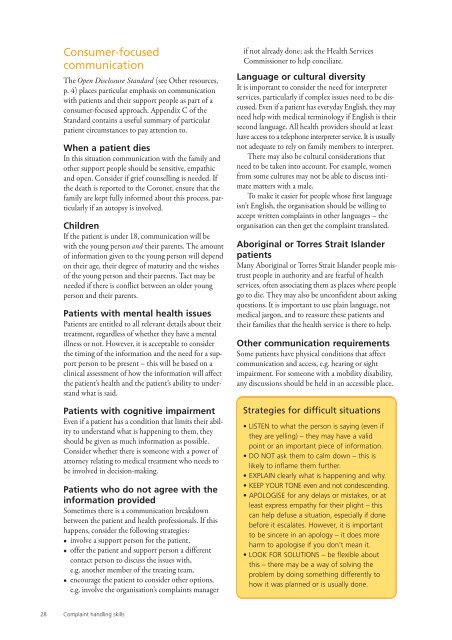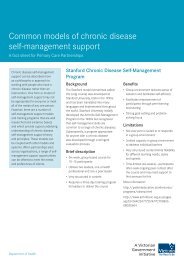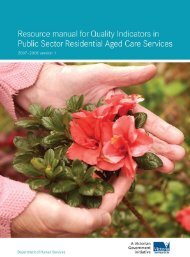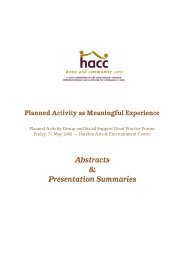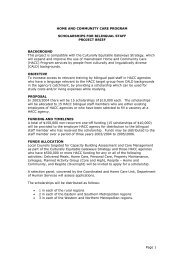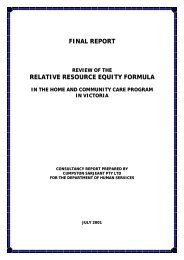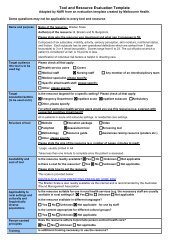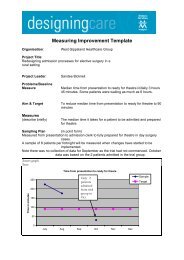Guide to Complaint Handling in Health Care Services
Guide to Complaint Handling in Health Care Services
Guide to Complaint Handling in Health Care Services
You also want an ePaper? Increase the reach of your titles
YUMPU automatically turns print PDFs into web optimized ePapers that Google loves.
Consumer-focused<br />
communication<br />
The Open Disclosure Standard (see Other resources,<br />
p. 4) places particular emphasis on communication<br />
with patients and their support people as part of a<br />
consumer-focused approach. Appendix C of the<br />
Standard conta<strong>in</strong>s a useful summary of particular<br />
patient circumstances <strong>to</strong> pay attention <strong>to</strong>.<br />
When a patient dies<br />
In this situation communication with the family and<br />
other support people should be sensitive, empathic<br />
and open. Consider if grief counsell<strong>in</strong>g is needed. If<br />
the death is reported <strong>to</strong> the Coroner, ensure that the<br />
family are kept fully <strong>in</strong>formed about this process, particularly<br />
if an au<strong>to</strong>psy is <strong>in</strong>volved.<br />
Children<br />
If the patient is under 18, communication will be<br />
with the young person and their parents. The amount<br />
of <strong>in</strong>formation given <strong>to</strong> the young person will depend<br />
on their age, their degree of maturity and the wishes<br />
of the young person and their parents. Tact may be<br />
needed if there is conflict between an older young<br />
person and their parents.<br />
Patients with mental health issues<br />
Patients are entitled <strong>to</strong> all relevant details about their<br />
treatment, regardless of whether they have a mental<br />
illness or not. However, it is acceptable <strong>to</strong> consider<br />
the tim<strong>in</strong>g of the <strong>in</strong>formation and the need for a support<br />
person <strong>to</strong> be present – this will be based on a<br />
cl<strong>in</strong>ical assessment of how the <strong>in</strong>formation will affect<br />
the patient’s health and the patient’s ability <strong>to</strong> understand<br />
what is said.<br />
Patients with cognitive impairment<br />
Even if a patient has a condition that limits their ability<br />
<strong>to</strong> understand what is happen<strong>in</strong>g <strong>to</strong> them, they<br />
should be given as much <strong>in</strong>formation as possible.<br />
Consider whether there is someone with a power of<br />
at<strong>to</strong>rney relat<strong>in</strong>g <strong>to</strong> medical treatment who needs <strong>to</strong><br />
be <strong>in</strong>volved <strong>in</strong> decision-mak<strong>in</strong>g.<br />
Patients who do not agree with the<br />
<strong>in</strong>formation provided<br />
Sometimes there is a communication breakdown<br />
between the patient and health professionals. If this<br />
happens, consider the follow<strong>in</strong>g strategies:<br />
• <strong>in</strong>volve a support person for the patient,<br />
• offer the patient and support person a different<br />
contact person <strong>to</strong> discuss the issues with,<br />
e.g. another member of the treat<strong>in</strong>g team,<br />
• encourage the patient <strong>to</strong> consider other options,<br />
e.g. <strong>in</strong>volve the organisation’s compla<strong>in</strong>ts manager<br />
if not already done; ask the <strong>Health</strong> <strong>Services</strong><br />
Commissioner <strong>to</strong> help conciliate.<br />
Language or cultural diversity<br />
It is important <strong>to</strong> consider the need for <strong>in</strong>terpreter<br />
services, particularly if complex issues need <strong>to</strong> be discussed.<br />
Even if a patient has everyday English, they may<br />
need help with medical term<strong>in</strong>ology if English is their<br />
second language. All health providers should at least<br />
have access <strong>to</strong> a telephone <strong>in</strong>terpreter service. It is usually<br />
not adequate <strong>to</strong> rely on family members <strong>to</strong> <strong>in</strong>terpret.<br />
There may also be cultural considerations that<br />
need <strong>to</strong> be taken <strong>in</strong><strong>to</strong> account. For example, women<br />
from some cultures may not be able <strong>to</strong> discuss <strong>in</strong>timate<br />
matters with a male.<br />
To make it easier for people whose first language<br />
isn’t English, the organisation should be will<strong>in</strong>g <strong>to</strong><br />
accept written compla<strong>in</strong>ts <strong>in</strong> other languages – the<br />
organisation can then get the compla<strong>in</strong>t translated.<br />
Aborig<strong>in</strong>al or Torres Strait Islander<br />
patients<br />
Many Aborig<strong>in</strong>al or Torres Strait Islander people mistrust<br />
people <strong>in</strong> authority and are fearful of health<br />
services, often associat<strong>in</strong>g them as places where people<br />
go <strong>to</strong> die. They may also be unconfident about ask<strong>in</strong>g<br />
questions. It is important <strong>to</strong> use pla<strong>in</strong> language, not<br />
medical jargon, and <strong>to</strong> reassure these patients and<br />
their families that the health service is there <strong>to</strong> help.<br />
Other communication requirements<br />
Some patients have physical conditions that affect<br />
communication and access, e.g. hear<strong>in</strong>g or sight<br />
impairment. For someone with a mobility disability,<br />
any discussions should be held <strong>in</strong> an accessible place.<br />
Strategies for difficult situations<br />
• LISTEN <strong>to</strong> what the person is say<strong>in</strong>g (even if<br />
they are yell<strong>in</strong>g) – they may have a valid<br />
po<strong>in</strong>t or an important piece of <strong>in</strong>formation.<br />
• DO NOT ask them <strong>to</strong> calm down – this is<br />
likely <strong>to</strong> <strong>in</strong>flame them further.<br />
• EXPLAIN clearly what is happen<strong>in</strong>g and why.<br />
• KEEP YOUR TONE even and not condescend<strong>in</strong>g.<br />
• APOLOGISE for any delays or mistakes, or at<br />
least express empathy for their plight – this<br />
can help defuse a situation, especially if done<br />
before it escalates. However, it is important<br />
<strong>to</strong> be s<strong>in</strong>cere <strong>in</strong> an apology – it does more<br />
harm <strong>to</strong> apologise if you don’t mean it.<br />
• LOOK FOR SOLUTIONS – be flexible about<br />
this – there may be a way of solv<strong>in</strong>g the<br />
problem by do<strong>in</strong>g someth<strong>in</strong>g differently <strong>to</strong><br />
how it was planned or is usually done.<br />
28 <strong>Compla<strong>in</strong>t</strong> handl<strong>in</strong>g skills


